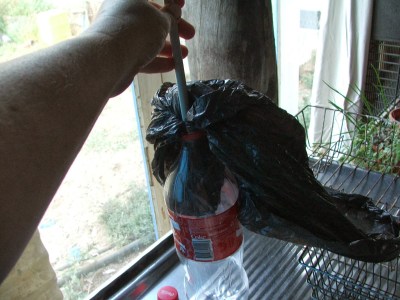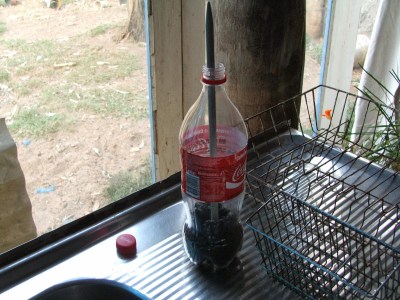Lately I have been thinking about rubbish; specifically the plastic and foil bits that seem to be wrapped around everything these days. We have no rubbish pick up here. No magic bin that mysteriously empties itself if I leave it by the road on a Tuesday night. We take our rubbish to the dump in the trailer and pay for the privilege of leaving it there (we also pay $150 a year to maintain the local dump on our rates). So I have started to think about ways to reduce our rubbish production.
We buy in bulk where we can and I send refillable containers to the local co-operative to be filled up with washing powder and detergent. Glass, recyclable plastic containers, aluminium and tin cans are taken to a recycling centre periodically. Food scraps, paper and cardboard are used in the chook pen for composting. That only leaves that annoying plastic; plastic wrap, Styrofoam trays, chip packets, chocolate wrappers and plastic bags. We commonly fill about one grain bag (20 litre size) per week of non-recyclable plastic.
I think I have found a solution at last;
Eco bricks. They have been used to build schools and houses in third world countries for a few years now and provide a handy way of getting rid of rubbish that would otherwise go into landfill.
Basically they involve stuffing clean plastic rubbish really tightly into PET bottles until they are full and hard, then put the cap back on. I have been making them for about two months now and have managed to produce about two a week. I never thought I would be thankful for my partner’s coca cola habit, but he manages to provide just enough bottles to keep up with the plastic we produce.
 |
| Step one; collect all the clean plastic rubbish you can (wash it if you have to) |
 |
| Step two; using a stick or an old knitting needle, shove the plastic rubbish down into the bottle.
Pack it down tight. |
 |
| Keep filling until you can’t jam any more in, then put the cap back on. |
 |
| Stock pile them somewhere and use them to build. |
 |
| Beautiful buildings like this. |
Maybe I will collect enough to build the toilet out of them…….
Is this idea too crazy?? Can I get the local council to approve? What do you think?

This is brilliant, Jude.
Garbage disposal isn't something I have given much thought to with my project. But it will be something that needs to be addressed – none of the land I am looking at enjoys a waste collection service. This is a really creative way of 'getting rid' of stuff that would otherwise sit in landfill.
I am not sure how you would go with council but why not use these bricks for something else? Perhaps one of those neat bottle brick fences that the hippies seem to like building? 😛
Not too crazy! Great to see someone thinking about how much rubbish they generate and how to use it constructively. I'll be interested to see what you end up doing with them.
Go for it Jude. Do you have to get the council to approve your dunny? They haven't worried about what dunny you are using up till now… At some point in my mudding journey it was suggested you could put empty plastic bottles inside mud walls to reduce the amount of mud you have to make and they assist with insulation. So even if you don't use them on their own to build your dunny another option is to build them into mud walls. Whatever works out the easiest when the time comes I guess. D x
A bottle fence sounds great; I would have to cover it over with something though, the bottles just provide the bulk material. I like to think of using my own rubbish as taking responsibility for myself.
It will be very interesting to see what I do with them (as I still have no real plan).
Hi Donna, great to hear from you.
The council does have to approve a permanent toilet and they have guidelines for .sometime use' toilets too (which is what ours is supposed to be. The method for building with the bottles uses mud as a mortar and a render over the bottles so using them in a wall is possible. There are actually two methods for using them; one is as bricks, lying on their sides, to make a tick, load bearing wall and the other is to encase them in chicken wire, standing up, to create a thin infill wall which is then rendered over. Both look pretty good, and use up a lot of stuff that would otherwise be landfill or part of the trash vortex in the Pacific ocean.